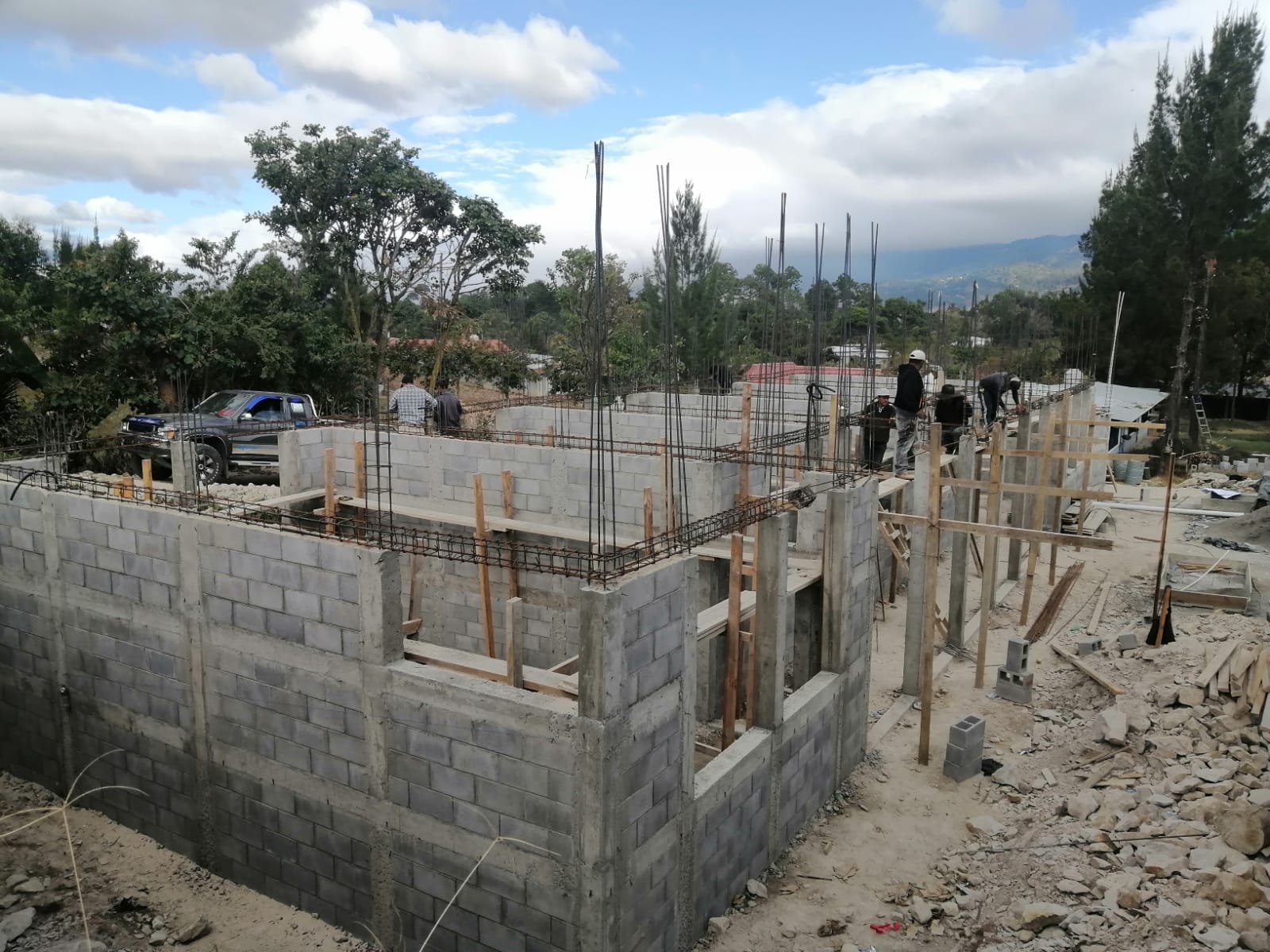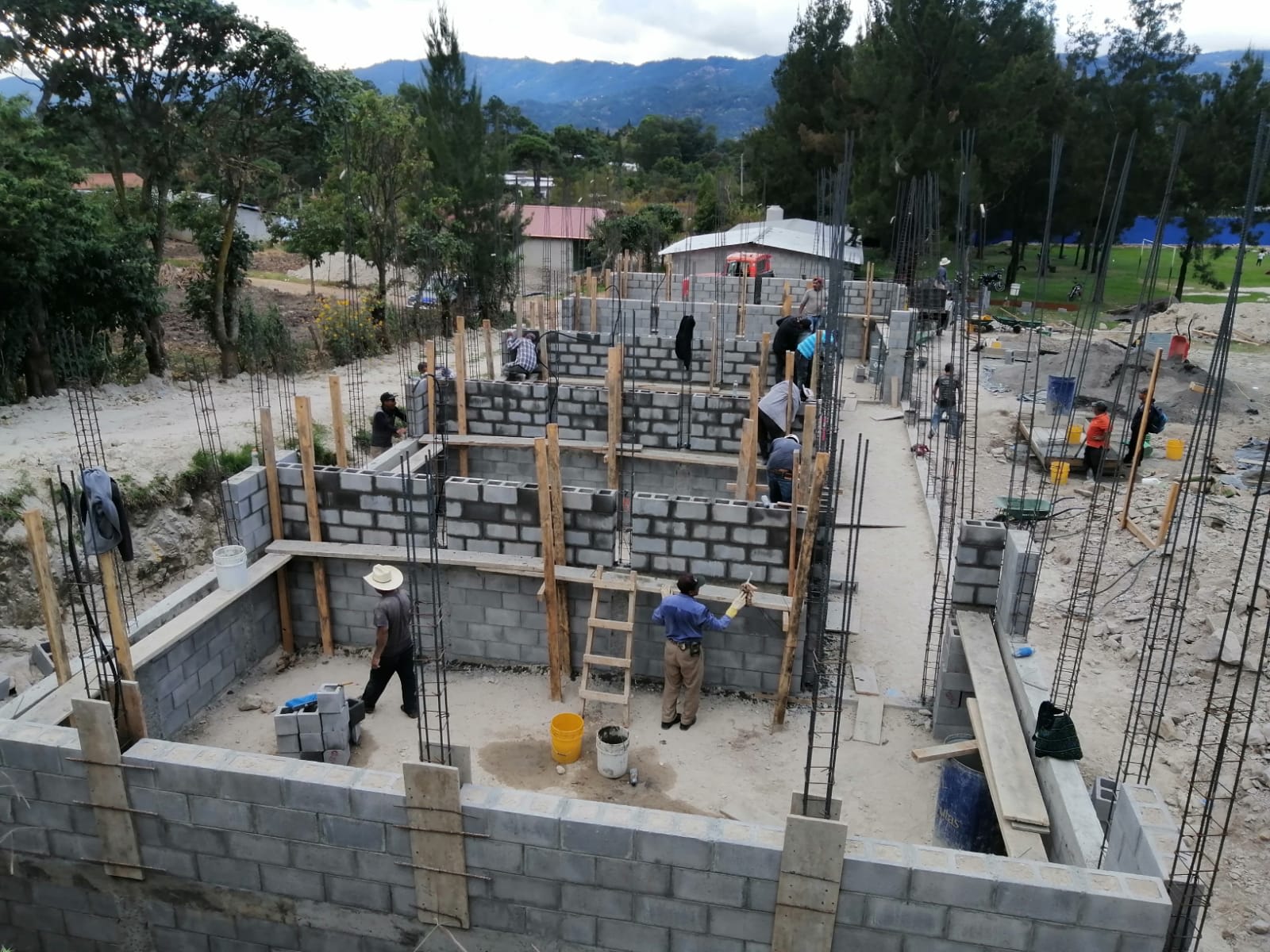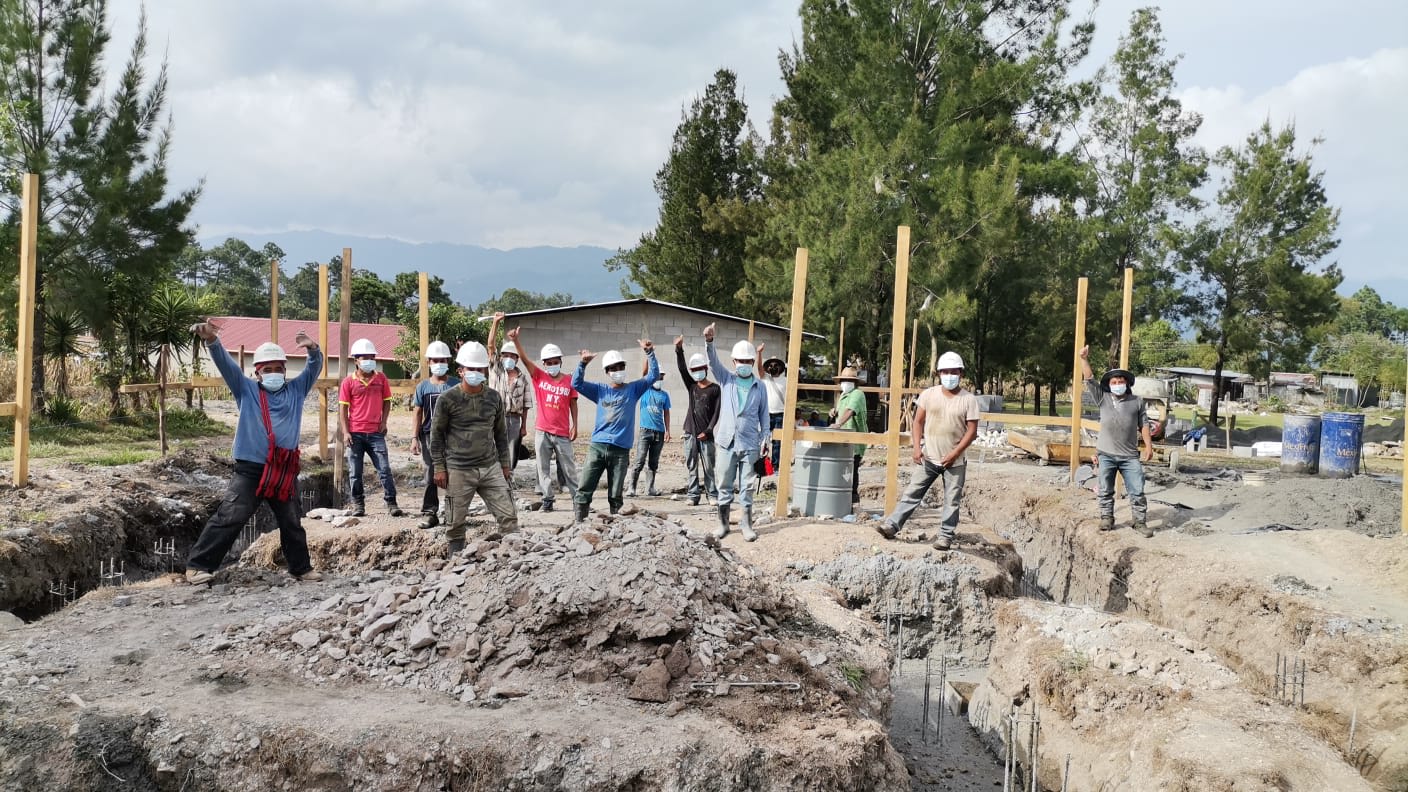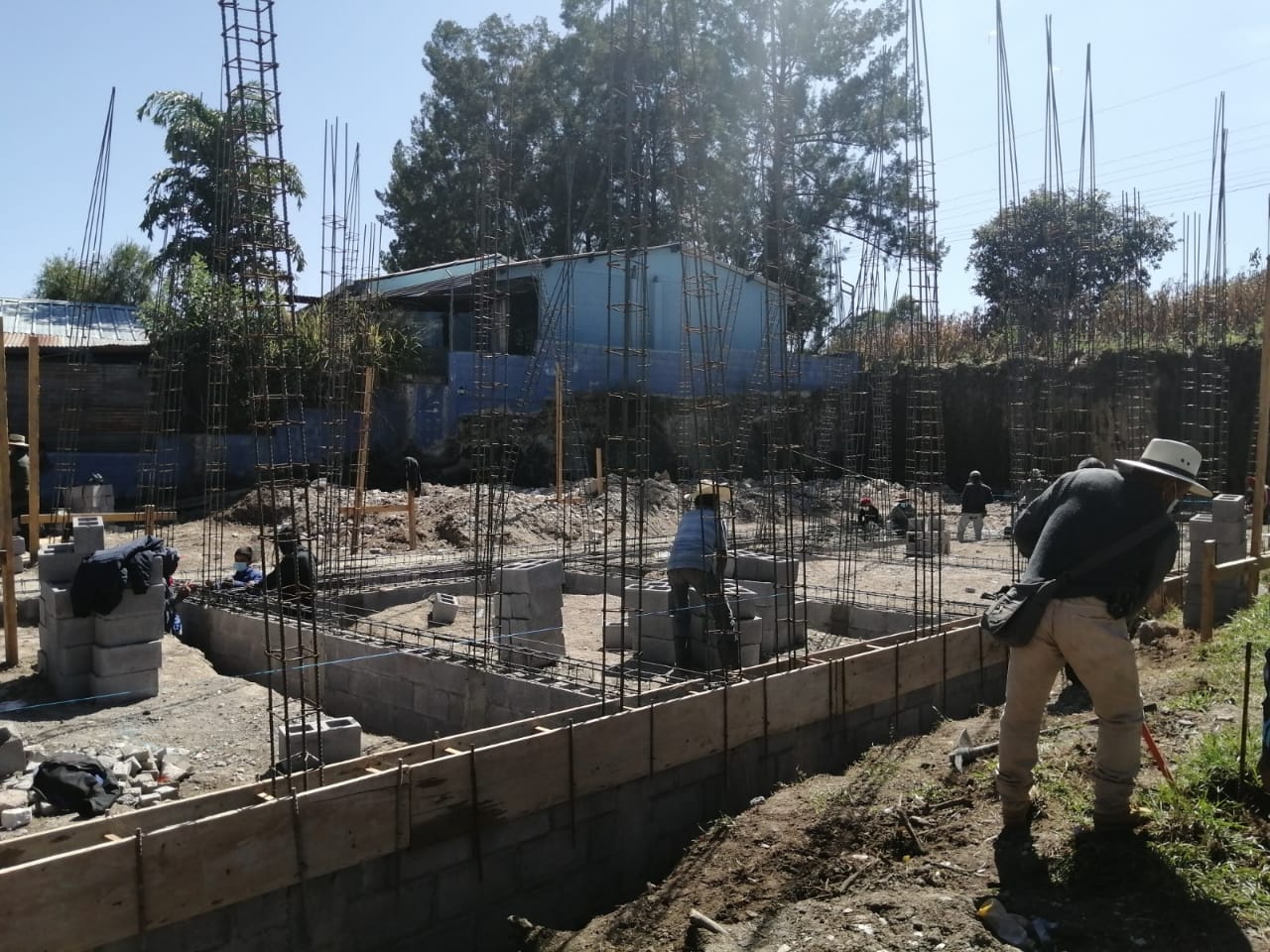The construction at Chosavic School continues to advance. The reinforcing for the beams over the windows are being placed.
Thanks for your support.

The construction at Chosavic School is progressing rapidly. The walls now have 10 courses of block. You can make out the rooms and the window and door openings.
Thanks for your support.

As the faculty advisor of the MSOE chapter of EWB-USA, I have been impressed with EWB-USA’s approach to development projects. I’d like to highlight a selection of their ten guiding principles which inform our approach and activities.
Community Driven: All projects are identified and initiated by the local Community Development Committee. The Municipality of Joyabaj provides initial screening, as the mayor’s planning department approves and prioritizes the projects. Next, the project is vetted by EWB-USA’s in-country Guatemalan staff of engineers and construction professionals, which includes site visits and meetings with local leadership. When the Guatemala office has satisfactorily concluded that the request is a legitimate project need and that the community is committed to working to bring it to fruition, our EWB-USA chapter is then brought on board. This process gives me assurance that our projects are meeting legitimate needs while contributing to local sustainable development.
Commitment from the community and local government institutions: What is often referred to as local “buy-in” is crucial to the sustainability of any development project. All our projects involve a partnership of four parties (MSOE, the Mayor of Joyabaj, the local Community Development Committee, and EWB-USA). The Municipality of Joyabaj contributes 25% of total project costs; the recipient community contributes 5% of material costs in addition to volunteer labor over the entire construction phase. This includes site preparation before the volunteer team arrives, the participation of approximately 30 men per day while the team is in-country, and the completion of remaining tasks upon the team’s departure. A tremendous amount of sweat equity goes into every project by the recipient community. In addition to donations from other sources (e.g., Rotary Club of Milwaukee), the MSOE chapter of EWB-USA covers the balance of the costs.
Trustworthy Partners: We have worked within the Joyabaj community for over a decade. During that time, we have developed strong relationships with local government, community development leaders, material suppliers, and engineering and construction professionals. This ten-year period has enabled us to develop strong bonds of trust. For example, I have complete confidence that when the mayor’s office commits to supply all the gravel, sand, and cement bags for a project prior to our arrival, they will be on-site when we arrive. The municipality also provides heavy machinery when excavation is needed. For water projects, the municipality first constructs the water source (usually a well) and local water committees are created to collect fees for maintenance and repairs. Only once this system is established, will an EWB-USA team become involved in the design and construction of the distribution system.
Quality Control: While these projects are designed by students, there is a well-established project process to ensure quality and safety. All our projects are reviewed by the faculty advisors that hold professional engineering licenses before delivering them to our professional mentors for review and approval. The projects undergo the third level of review by independent volunteer professional engineers provided by EWB-USA. Finally, our projects are also reviewed by professional Guatemalan engineering staff at the Guatemalan office of EWB-USA. The multiple layers of review assure me that our designs are both technically sound and culturally appropriate.
We are a non-profit humanitarian engineering organization that works with communities in Guatemala to help them achieve their development goals. The MSOE chapter of EWB-USA has worked alongside Guatemalan communities since 2008 via specific infrastructure projects such as schools, bridges, and water distribution systems. EWB-USA has a two-fold mission to build "…a better world through engineering projects that empower communities to meet their basic human needs and equip leaders to solve the world’s most pressing challenges (https://www.ewb-usa.org/mission-and-history/).
We prepare our student members with skills and understanding that equips them to work with others who have different life experiences. First and foremost, we introduce our student members to a healthy framework for engagement with the majority world. Healthy engagement is one in which local institutions are strengthened in the entire project process, during which student members are conscious of the reality that mutual learning is taking place. In sync with MSOE’s focus on Servant Leadership, recognizing the skills and knowledge within the communities themselves and exhibiting cultural humility are indispensable.
Building upon that philosophical foundation for engagement, we equip students to apply their technical and professional skills – as a team in a multicultural context – from the very beginning with pre-project site assessments, and subsequently during client feedback on alternative analyses, final designs, and construction planning, and finally during the construction itself.
We have a steady project cycle that is largely student-run and implemented. The chapter is heavily student-led by upperclassmen student officers and project managers. MSOE professors, alongside engineers, construction managers, and architects from the Wisconsin Professional Partners (WPP) chapter of EWB-USA, provide additional student mentorship. The project cycle for which our student members are responsible is comprehensive and robust, and students are responsible for all the technical aspects of the project as mentioned in the above project descriptions.
A team of students, faculty, and professional mentors travel to Guatemala approximately once a year to engage in the following activities: (1) work alongside the community to construct the current year's project, (2) assess the next year’s project, and (3) visit the previous year’s project for follow-up.
The construction of the Chosavic school expansion started in October led by EWB-USA/Guatemala foreman Cleto Jiatz who oversaw a volunteer crew from the community. By mid-November the concrete foundation and masonry stem walls have been constructed and the grade beams have been formed and are ready to be cast.



The first 20 gifts of $50 or more will receive a copy of Bridging Barriers. Bridging Barriers is a new book written by Wisconsin resident Mike Paddock of EWB-USA. It details the events of how a Guatemalan community changed its future with help from an EWB-USA chapter to build a bridge and a water project. That said this book is very much a narrative about the human element of humanitarian engineering and displays well the ethics and operation of our organization. For more information visit https://www.bridgingbarriers.com/.